By Kayla Gilchrist
Oftentimes, many people confuse COVID-19 and its risks with influenza (flu), believing they are relatively the same.
“It’s not that serious; it’s just like the flu.”
“Why can’t they find a seasonal vaccine for coronavirus like they did for the flu?”
“I’ve had the flu before so I’m pretty sure I can handle COVID-19.”
Although both COVID-19 and the flu share similar characteristics, such as both being contagious respiratory illnesses, they are caused by separate viruses which bring about some vital differences.
Coronaviruses are found in both humans and animals causing mild to moderate respiratory issues. COVID-19 is caused by a completely new coronavirus called SARS-CoV-2, which causes a more severe illness. The flu is caused by influenza viruses — completely different strands of viruses than coronaviruses.

Due to some of the symptoms of the flu and COVID-19 being similar, it can be difficult to tell the difference without testing to confirm a proper diagnosis. Because COVID-19 comes from an entirely new strand of virus (SARS-CoV-2), we are learning more and more everyday.
Given the best and most updated information from the Centers for Disease Control and Prevention, below are some key differences and similarities between COVID-19 and influenza.
Similarities
1. Common symptoms shared by both COVID-19 and the flu which range from asymptomatic (no symptoms) to severe are:
- Fever or feeling feverish/chills
- Cough
- Shortness of breath or difficulty breathing
- Fatigue (tiredness)
- Sore throat
- Runny or stuffy nose
- Muscle pain or body aches
- Headache
- Some people may have vomiting and diarrhea, though this is more common in children than adults
2. For both the flu and COVID-19, one or more days can pass before an infected person starts to experience signs of illness or symptoms.
3. It’s possible to spread both viruses up to 24 hours before showing any symptoms.
4. Both can spread between people within about 6 feet or from person-to-person contact through droplets made when an infected person coughs, sneezes, or talks. These droplets can reach the mouth, nose, or be inhaled into the lungs of someone nearby an infected person. Both viruses can also spread through physical touch (e.g. shaking hands) or by people touching infected surfaces then touching their face.
5. Both COVID-19 and flu pose the highest risk to:
- Older adults
- People with certain underlying medical conditions
- Pregnant women
6. Both COVID-19 and flu can cause these complications:
- Pneumonia
- Respiratory failure
- Acute respiratory distress syndrome (i.e. fluid in lungs)
- Sepsis
- Cardiac injury (e.g. heart attacks and stroke)
- Multiple-organ failure (respiratory failure, kidney failure, shock)
- Worsening of chronic medical conditions (involving the lungs, heart, nervous system or diabetes)
- Inflammation of the heart, brain or muscle tissues
- Secondary bacterial infections (i.e. infections that occur in people who have already been infected with flu or COVID-19)
7. Anyone with a high-risk of complications and/or who have been hospitalized for COVID-19 or flu should receive proper medical care.
8. Any and all vaccinations for COVID-19 and flu must be approved or authorized for emergency use (EUA) by the FDA.
Differences
1. If you have COVID-19, it could take longer to develop symptoms than if you have the flu — up to 14 days after infection. A person with the flu usually develops signs and symptoms anywhere from one to four days after infection. Unlike the flu, with COVID-19 you may also experience a change in or loss of taste or smell as part of your symptoms.
2. If you have COVID-19, you might be contagious longer than if you have the flu. Most people with the flu are contagious up to 7 days while those with COVID-19 can remain contagious up to 10 days.
3. COVID-19 is believed to be more contagious. It’s been observed to spread quicker and more easily to a wider range of people than the flu.
4. Children are more at risk for complications from the flu than from COVID-19, however the CDC states that “both infants and children with underlying medical conditions are at increased risk for both flu and COVID-19.”
5. School-aged children pose a higher risk of a rare but severe complication of COVID-19 called Multisystem Inflammatory Syndrome in Children (MISC).
6. Those with the flu will most likely recover in less than two weeks unless they develop complications, whereas recovering from COVID-19 could take up to two weeks and even longer should complications develop.
7. The flu has FDA-approved influenza antiviral drugs to treat it and multiple vaccines produced annually for prevention. Studies, including a study on an antiviral agent called Remdesivir, which is available under Emergency Use Authorization (EUA), are still in progress on how to prevent and treat COVID-19. The National Institutes of Health (NIH) developed a regularly updated guide on treatment of COVID-19 here https://www.covid19treatmentguidelines.nih.gov
Here are resources to use for what to do if you are sick with COVID-19 or the flu and how to prevent them:
https://www.cdc.gov/coronavirus/2019-ncov/if-you-are-sick/steps-when-sick.html
https://www.cdc.gov/flu/treatment/takingcare.htm
https://www.cdc.gov/coronavirus/2019-ncov/prevent-getting-sick/
https://www.cdc.gov/flu/prevent/index.html
Sources: https://www.cdc.gov/flu/symptoms/flu-vs-covid19.htm
https://www.ynhhs.org/patient-care/urgent-care/flu-or-coronavirus
https://www.hopkinsmedicine.org/health/conditions-and-diseases/coronavirus

Kayla Gilchrist is an adventure-seeking, fun-loving, Christ-oriented, twenty-something with an extensive background in media and a knack for writing. She received her bachelor’s in communications with a minor in theatre arts from Prairie View A&M University. When she isn’t writing or managing social media accounts, Kayla enjoys acting, directing short films, delicious food, poetry, swimming, novels, and spending time with family and friends. She happily just joined the City of Waco team and is excited to use her skills as a helpful resource during the COVID-19 pandemic.
The Act Locally Waco blog publishes posts with a connection to these aspirations for Waco. If you are interested in writing for the Act Locally Waco Blog, please email [email protected] for more information.
By Wendy Cox
When my family lived in another country and found ourselves suddenly functioning in a language and culture unknown to us, daily activities formerly done with unconscious ease became laborious, requiring more cognitive effort than I could have imagined would ever be reasonable. We relied on the patience, kindness, and practical help of friends. Through them, the burdens became bearable, even joyful, as our initial dependence created conditions in which mutually beneficial relationships were strengthened over time.
Since March, COVID-19 has put us in a similar circumstance. Risk-benefit decisions about daily life, formerly made unconsciously, suddenly came to dominate my waking (and sometimes sleeping) hours. I had to think through each one in light of the viral news of the day.
Should I risk another grocery trip in hopes of finding toilet paper?
Should I let my teens have a picnic with friends?
Should we or shouldn’t we visit my in-laws?
And the more sobering decisions —
How do we do family funerals?
How do we care for loved ones who are in the hospital?
And now administrators, teachers, families, and children are facing all manner of risk-benefit decisions as the fall semester approaches.
Whether you are directly involved in back-to-school decisions or not, every one of us has a stake in how this effort goes. That’s the nature of coronavirus. It spreads through the community, between people with and without symptoms, to people with low risk of illness and death and those who are at great risk.
These categories are not always apparent to us, and we likely won’t be able to “see” the outcome of our actions. We know that children can have COVID-19, that some develop symptoms, and that a few cases can be severe. We don’t yet know how infectious children are to others, but we do understand that community-wide prevalence influences case counts within schools and vice versa.
Alongside all of us who care about schools and teachers and students, it is imperative that you join our entire community in acting on what research has taught us about suppressing the spread of coronavirus. In addition to wearing masks, practicing good hygiene, and staying safely distanced, I propose we go a step further and find creative ways that lie within our skills and resources to make it easier for everyone to follow through with safety guidelines. Here are some ideas to consider:
Masks — Masks decrease viral spread making them beneficial to the wearer and everyone else. The more mask-wearers in the room, the safer everyone is. Deciding to wear a cloth face covering is the baseline. Some people want to choose the very best material (see Best Household Materials for a Mask, scroll down on page), but within reason, the best mask is the one people can tolerate wearing when they need to. Be patient with children (or yourself!) until you find the right one.
If you wear glasses, you know how they tend to get foggy while wearing a mask. Share this and other ideas to help reduce the fog and make mask-wearing more pleasant (How to Prevent Glasses from Fogging Up While Wearing a Mask).
Expect children to soil, lose, and forget masks during the school day. Could you volunteer to keep a laundered stash of cloth masks available in your child’s classroom? Recently, I encountered a friend and her soon-to-be kindergartener shopping for treats so her daughter could practice wearing a mask. How kind. We can all practice modeling such a generous attitude toward mask-wearing (and it does take practice!)
Outdoor Activities — Being outdoors is considered to be safer than being indoors. Is there anything you can do to make this idea appealing to your child’s teachers? Maybe you have time to volunteer as an aide to help keep children on task. Maybe you don’t have time, but you have money. Consider purchasing a class set of outdoor chairs (Folding Chair, Portable Lap Desk). Maybe you have skills. Could you volunteer time to help schools create shade structures or plant trees?
These suggestions are obviously incomplete, but they encourage a way of thinking that considers communal efforts and outcomes along with our more individual concerns. With a community mindset, we may find joy and stronger relational ties along the way. I could use more of both in my life right now.
I promise to act in ways that protect you and your family members’ health, even though we might never meet. Will you do the same for me?
Know that we are connected
in ways that are terrifying and beautiful.
(You could hardly deny it now.)
Know that our lives
are in one another’s hands.
(Surely, that has come clear.)
from Lynn Ungar’s poem “Pandemic”
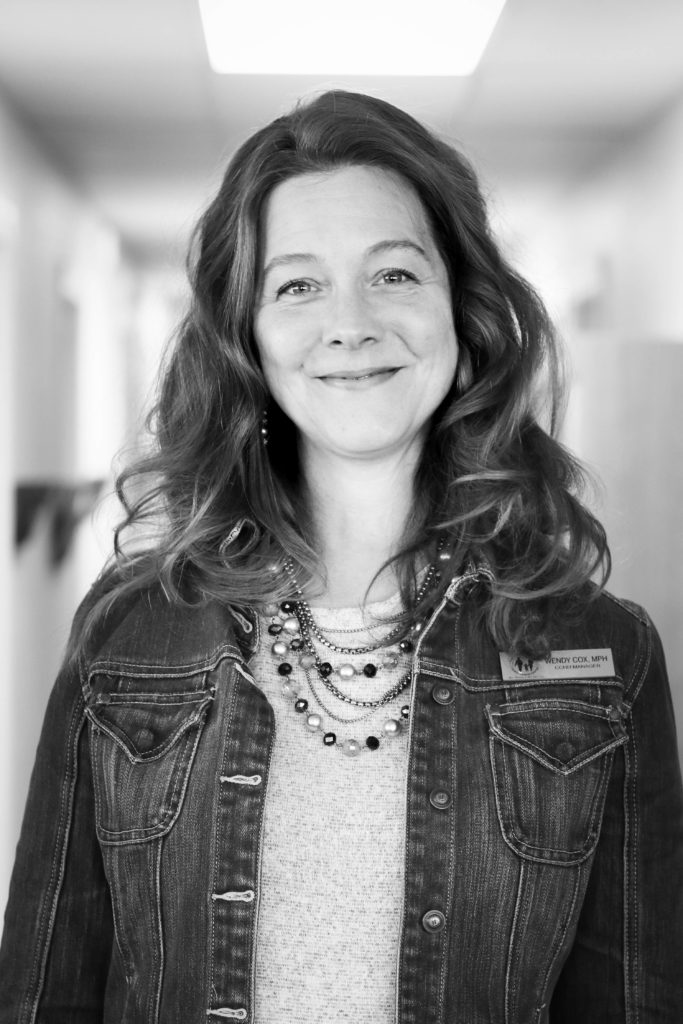
Wendy Cox is a long-time educator who followed her interests into the public health field. She is proud to work alongside colleagues at the Family Health Center in the area of community health engagement. In her spare time, she loves to enjoy time in nature, take long walks with family and friends, and experiment in the kitchen with whatever seasonal foods she’s found at the Waco Downtown Farmers Market.
The Act Locally Waco blog publishes posts with a connection to these aspirations for Waco. If you are interested in writing for the Act Locally Waco Blog, please email [email protected]for more information.
By Brayley Payne
After a long season of quarantine through the COVID-19 pandemic, the City of Waco is finally re-opening its doors. This includes restaurants, coffee shops, and other Waco favorites — the Waco-McLennan County Library and various Parks and Recreation services in the Waco area.
The library, at all four locations, is set to open Monday, June 15. The hours will be limited, Monday through Friday 10 a.m. – 6 p.m.. Visitors will be able to browse like usual and check out items. While there will be browsing, there will be no public seating in the library at this point.
“We are taking this phased approach because the situation is fluid and plans need to be flexible so we can make changes as information becomes available,” said Library Director Essy Day.
Social distancing will be encouraged throughout the libraries. The computers will also be six feet apart, and time will be limited to one hour per day for each user. After a user leaves, the staff will clean the computer area. The library recommends using the outdoor drop when returning items in order to effectively quarantine the previously checked-out items. Visitors are encouraged to wear face masks.
Waco Parks and Recreation has created modified programs for the summer, but they will still be fun! The RECess! summer program has already begun, and it aims to provide a fun alternative to the camps that have been canceled due to COVID-19. This program will be virtual for daily, at-home activities. Check the department’s Facebook page each day for updates.
The department’s outdoor pavilions, indoor facilities, and park areas are now available for rental! On June 15, Bledsoe-Miller, Dewey, and South Waco community centers will reopen. The new hours will be: Monday-Thursday 9 a.m. – 9 p.m.; Friday 9 a.m. – 6 p.m.; and Saturday 9 a.m. – 3 p.m..
June 15 is also the start date for organized sports and competitions on city property and in city facilities. Riverbend Park will reopen for games and use on June 15, as well. Waco Mammoth National Monument has opened its trail and picnic area for use. The dig shelter tours, however, are still on hold to reopen, and park buildings will remain closed for the time being.
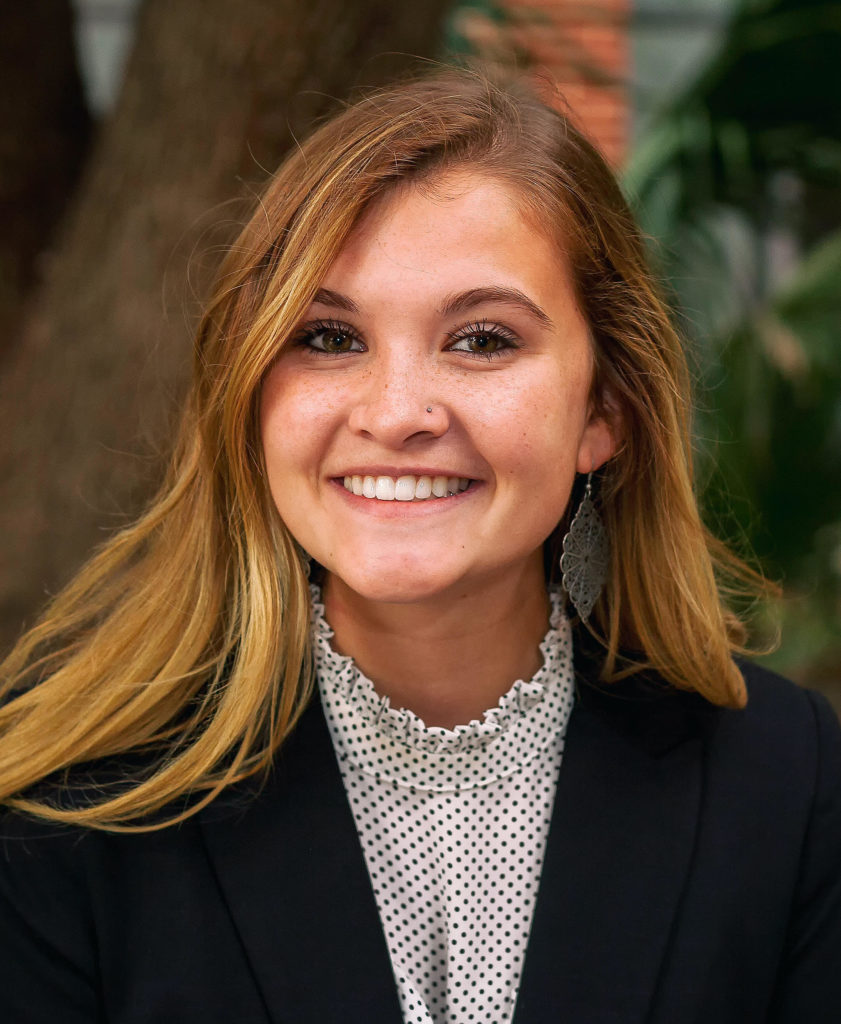
Brayley Payne is an Act Locally Waco intern from Denver. She’s studying professional writing and religion at Baylor University and entering her senior year. She has worked in the Baylor University Writing Center the last two years.
By Trent Sutton
“All the world’s a stage.”
Though we aren’t performing those particular words of Shakespeare in A Midsummer Night’s Dream, those words have truly been put to the test as we have prepared this performance.
Wild Imaginings had planned to launch our Summer Shakespeare series this summer anticipating it being a big community event that would become annual fare for years to come. Much like the rest of the world, all of those plans were brought into serious question in the midst of the rise of COVID-19.
We felt, however, that we ought to press ahead, even in the face of uncertainty. We’re an arts organization after all, and limitations are nothing more than creative boundaries.

With this in mind, we held auditions for the show via Zoom and proceeded to have rehearsals for the show via Zoom. I can’t say it’s something I recommend. I think we all got really tired of one another’s faces on our computer screens. But despite the fact that we couldn’t plan our movement for the show, we worked through the script as best we could while online.
And truly, through this process, we have discovered that all the world is indeed a stage. Even virtually speaking. Sometimes we came together not just from different homes but from different cities and even different states. And all the while, we prepared, we worked through the text, we developed our characters, and when it was finally safe to rehearse in person, we dove in head-first, ready to put it all together. And in just a couple short weeks, we have had to transfer everything we learned via Zoom to the real in-person world.
The third commitment which Wild Imaginings holds in its value statement is “cultivating a willingness to explore, experiment, and otherwise push the boundaries of what performing arts can be and the impact they can have on the community.” And you know, the world in which we currently find ourselves has put that commitment to the test.
We have explored the depths to which we can connect through online platforms; we have experimented with different ways of rehearsing and learning together; and we continue to push the boundaries of what performing arts can be, as we figure out ways to move from Zoom to my living room to finally Common Grounds.
And as far as impact on the community goes, we hope that this will be every bit the community event that we hoped it would be, albeit with smaller numbers of people. We are fully committed to the safety of our audience, which is why we’ll be working with Common Grounds to limit seating per state guidelines.
So to help navigate this challenge, we’ve decided to record a performance so that people can buy “tickets” to the recording.
Our goal from the beginning in launching this Summer Shakespeare production has been to make it accessible to anyone who wants to come. We believe ART IS FOR EVERYONE. In our efforts to maintain this desire, we want to be sure it remains accessible, even for those who may not yet be comfortable venturing out.
We cannot wait to share this with the Waco community. A Midsummer Night’s Dream has been such fun to work on, despite the challenges we faced. I’ve had the privilege of working with an amazing cast, and I hope you’ll take the opportunity to see them perform, because it’s definitely worth it.
Love triangles, angry fathers, fairy magic, mischief, and even a play within a play (I think that’s called playception). This is a Shakespearean work of art that you’re going to want to make sure is a part of your summer.
Tickets can be found at http://wildimaginingswaco.com/shakespeare/.
And even if you can’t make it, you can purchase a “ticket” to the video recording when we have it or else just make a donation. We need your help to make Summer Shakespeare something that we can share with the Waco community for years to come.

Trent Sutton is founder and artistic director of Wild Imaginings, a newly formed performing arts nonprofit here in Waco. He has recently graduated from Truett Seminary with his Master of Divinity and has already made Waco his home. He is passionate about the arts and believes them to be the best way in which he can contribute to the city he has grown to love so much. He believes Wild Imaginings is uniquely positioned to truly bring a different flavor of art to Waco, and he is excited for what this new adventure will bring. His desire is that this community be limited only by the scope of their imaginations. His favorite thing is sharing dreams and ideas and working together to bring them to life. So don’t hesitate to reach out.
(From Waco’s COVID-19 Community Newsletter)
As the Central Texas community participates in demonstrations and protests against the killing of George Floyd and continued racial injustice and inequity, community leaders encourage health and safety precautions for group gatherings. Dr. Iliana Neumann of Family Health Center shares a few health tips for community members participating in protests and demonstrations.
We encourage organizers to provide masks and hand sanitizer to the extent they can and to model the use of such as well as practice physical distancing as much as possible.
- Assembling does increase your risk of contracting COVID-19, but there are things you can do to lessen this risk.
- Gather outside rather than inside.
- Wear a cloth face covering.
- Physically distance as much as possible.
- Do not share signs or markers with anyone who is not a member of your household.
- Take hand sanitizer and gloves with you. Use hand sanitizer often.
- If distributing materials, encourage folks to take a picture of the materials with their phone instead of handing off paper or other items.
- Bring water and drink it often.
- Wear sunscreen.
- Reduce respiratory droplets by focusing on signs/posters and making noise with music, drums, etc. rather than loud talking.
- Carry identification and a list of emergency contacts.
- Go with a buddy and stay closer to them rather than new contacts.
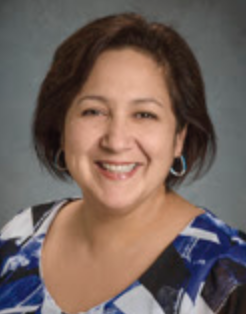
Dr. Iliana Neumann is a family medicine specialist. She graduated with honors from East Carolina University School Of Medicine in 2009. She is a faculty physician with Waco’s Family Health Center.
NEWS RELEASE
ADOPTION WEEKEND JUNE 5-7
The Humane Society of Central Texas will participate in the ASPCA National Adoption Weekend June 5-7 to encourage the public to safely complete adoptions from home amid the COVID-19 crisis.
During this time, HSCTX will hold Zoom meetings each day at 11 a.m. for the public to participate in virtual introductions to dogs that are available for adoption. The shelter has remained operational throughout COVID, but our buildings are not open to the public. One result is that animal adoptions have decreased over the last 3 months.
We are conducting these virtual introductions to increase our adoption rate and get homeless animals into loving homes.
To find out more about our minimal-exposure, contact-free adoption process visit humanesocietycentraltexas.org or call 254-754-1454.
MORE INFO: Visit ASPCA.org/AdoptFromHome for more information about the ASPCA National Adoption Weekend, including a comprehensive map of participating animal shelters and rescue groups. This initiative will encourage the public — including people currently caring for foster animals — to complete adoptions from their homes to safely place thousands of homeless dogs, cats, and horses into adoptive homes across the country.
During this period of uncertainty, it’s more important than ever for people to consider adopting a new animal not only for their benefit, but also to free up space and resources for other vulnerable animals in need.
Follow along on social media @ASPCA or use the hashtag #AdoptFromHome to see the nationwide campaign in action. Potential adopters are also encouraged to stay updated on local efforts by following @HSCTX at facebook.com/hsctx, twitter.com/drpaulahsctx,
and Instagram.com/hsctx.
#
About the Humane Society of Central Texas
As an advocate for the animals at the City of Waco Animal Shelter, the Humane Society of Central Texas provides adoptions, rescue and foster opportunities, as well as community education regarding responsible pet ownership. The partnership between HSCTX and the City of Waco Animal Services, along with the support of the community, City of Waco, Central Texas and beyond, has resulted in a current average live-exit rate of above 90%. Our goal is to save each and every healthy or treatable animal that
comes into the shelter because we believe that every Waco animal deserves a chance. With the continued help and support of every person who has a heart for homeless pets, we believe it can be done!
About the ASPCA®
Founded in 1866, the ASPCA (The American Society for the Prevention of Cruelty to Animals) is the first animal welfare organization in North America and serves as the nation’s leading voice for animals. More than two million supporters strong, the ASPCA’s mission is to provide effective means for the prevention of cruelty to animals throughout the United States. As a 501(c)(3) not-for-profit corporation, the ASPCA is a national leader in the areas of anti-cruelty, community outreach and animal health
services. For more information, please visit www.ASPCA.org, and be sure to follow the ASPCA on Facebook, Twitter, and Instagram.
By Rachel E. Pate
“In a racially equitable society, the distribution of society’s benefits and burdens would not be skewed by race.” – The Aspen Institute
Brief Rewind
Around this time last year, the City of Waco, our mayor and city council held a retreat addressing racial inequity within our community. J.B. Smith, Waco Tribune-Herald reporter, covered the story in “Waco council takes aim at racial disparities, gentrification” (May 23, 2019). Some of the staggering statistics gathered and presented by the city were highlighted in J.B.’s article, revealing that:
- Whites account for 43% of Waco’s population but hold 80% of the jobs paying more than $40,000 as of 2015.
- Among white households, 13.5% make less than $25,000 a year, compared with 25.3% among Hispanics and 51.1% among blacks.
- Nearly 29% of white households make more than $100,000 a year, compared with 3.3% for blacks and 8.7% for Hispanics.
- African Americans in 2017 had a 31% mortgage denial rate, compared with 20.9% for Hispanics and 11.7% for whites.
In the news article Councilman Dillion Meek stated: “I’ve always put a high value on grit and self-determination, but if the goal is to improve the economy, we have to look at systems from 100 or 150 years ago to now,” Meek said. “The outcomes from the data speak for themselves and are a direct result of the history of this community.”
Assistant City Manager Deidra Emerson was also quoted saying: “The end goal is to ensure that everyone in Waco thrives, including people of color. … The starting point for the next generation is the ending point of the last generation. If we don’t start to change those outcomes now, we’ll keep repeating the same things.“
Pandemic Proportions
Positioned against the backdrop of a once-in-a-century global pandemic, we all witnessed our nation’s institutions, systems, businesses and, most importantly, people brace for a great unknown together. As the virus spread, we were forced to mourn more and differently than before, all while swallowing disproportionate effects happening in communities of color. The Pandemic drastically changed so much of what we thought we once knew and added to the boiling pot of health disparities, income disparities, racial disparities and inequity in the fabric of America.
As the wave of concern swept through our nation, our local leaders were called to immediate attention and action; elected officials, health officials, business experts and volunteer task forces were all on one accord.
The Cen-Tex African American Chamber of Commerce (CTAACC), along with others, was right in the thick of early and ongoing discussions about community health and our local economy. Our staff immediately pivoted from pre-set work to intentionally and strategically supporting the needs of our community’s small and minority-owned businesses.
We partnered with the Cen-Tex Hispanic Chamber of Commerce to support immediate small business initiatives like our StarBridge Bingo and Buy Local Waco online marketing campaigns. We worked together to collect grassroots data from businesses, employees and people of color.
CTAACC was firmly seated at the table with the city and other community partners breaking down information, providing frequent updates and contributing solutions.
Collective Voices
While weeks of the shelter-in-place orders and social distancing continued, CTAACC assembled an informal advisory group to work alongside our staff and help create solutions for business equity. Community business members and leaders included Wannika Muhammad, Rev. Marlon Jones and Cuevas Peacock, who each added diversity, passion and perspective to the dialogue. Our group later became known as the CommUnity Voices team. United in tackling the tasks before us, we put our heads together and strategically planned our moves ahead.
Within our virtual, weekly think-tank sessions, each member shared our concerns about equity, community and business. Each contributed wisdom and insight from our collective backgrounds in business and community development, religion and higher education and lived experiences. We examined and digested everything around us and studied the historical pre-sets of inequity.
As we saw increased unemployment rates for workers, struggling small businesses and government relief that could only do so much, the group determined that solid, perpetual initiatives were mandatory to rightfully shore up vulnerable, small, minority-owned businesses. In those conversations, our vision for equity was honed.
Forward March
The Chamber’s Center for Business Excellence (CBE) has long been an engine for small business development, offering free business tools, technology resources and meeting space. Utilizing this existing program, CTAACC established the Cen-Tex Minority Business (CTMB) Equity Fund in May 2020 to provide business relief to businesses of color through grant funding and micro-loans. (Donate Here.)
The CTMB Equity Fund is the first local fund in our community that will assist small minority-owned businesses facing income loss or rising expenses due to circumstances caused by natural disasters, illness, global pandemics, or any situation that disrupts their economic and social well-being.
The fund will also provide increased access to social capital and business training/education for entrepreneurs. Our kick-start campaign goal of $100,000 provides individuals, organizations and businesses with the opportunity to not only talk about equity but invest in it also. I could say more, but for now I’ll digress and take a breath. There’s still more action to be done tomorrow.
The Center of Business Excellence (CBE) is a private sector 501(c)(3) charity affiliated with the Cen-Tex African American Chamber of Commerce. The CBE actively helps McLennan County small businesses thrive by providing operational, social, and financial resources needed to sustain business development. The CBE manages the Cen-Tex Minority Business Equity Fund, a program created by the Cen-Tex African American Chamber of Commerce and a Business Advisory Committee comprised of community business members and leaders.
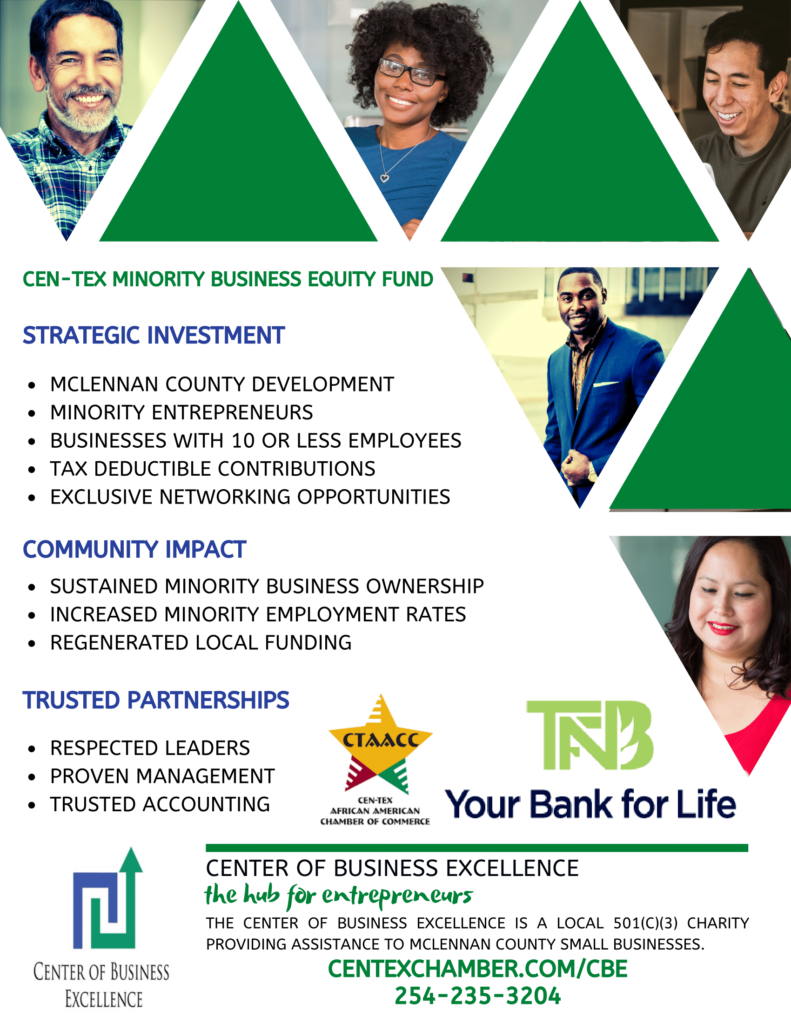
The purpose of the fund program is to provide short-term, immediate aid/relief to small, local minority-owned businesses facing income loss or rising expenses due to circumstances caused by natural disasters, illness, global pandemics, or any situation that disrupts their economic and social well-being.
Any McLennan County-based, minority-owned, small business with 10 employees or less is eligible to apply for assistance. Grants/loans may be awarded up to $2,500 dependent on resources. I could go on, but for now I guess I’ll digress and take a breather. There’s action to be done tomorrow.
Editor’s Note: Investments in the CTMB Equity Fund are currently being accepted online at www.centexchamber.com. The online application portal for business funding is expected to open later this month. CTAACC can be reached at (254) 235-3204.
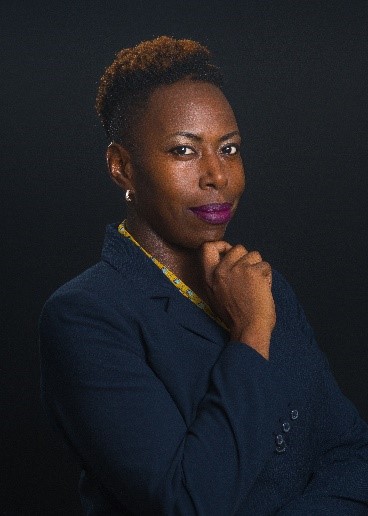
Rachel E. Pate is vice president of economic development at Cen-Tex African American Chamber of Commerce (CTAACC) in Waco. Rachel is a native Wacoan and graduate of University High School. Since 2016, Rachel has served in various roles at the chamber and championed the causes of small entrepreneurs, women, and minorities. She is also a LeadershipPlenty Institute graduate, Rapoport Academy Public School Board member and Start-Up Waco Board member.
With her mother being a Sunday School teacher and evangelist, Rachel began serving the community at a very early age. She was active on her church’s usher board and youth ministry. Some of her fondest memories of growing up in Waco are being surrounded by her large, extended family for reunions and Juneteenth gatherings; her mother is one of 11 siblings who all hail from Waco. Her father, R.E. Pate Jr. (deceased), and mother met at Paul Quinn College in the early 1970s — the same campus where CTAACC resides today.
Rachel is also a proud mom of one, a lifelong member of Toliver Chapel Church, a lover of the great outdoors, an avid basketball fan, and a dedicated wearer of Converse’s Chuck Taylor shoes. Rachel’s favorite scripture is Romans 8:31- “…If God be for us, then who can stand against us?”
From The Heart of Texas Region MHMR
Most teenagers strive for independence, want to be with their peers, and are looking ahead to the future. Given this, how do we care for young people during this time, when they aren’t able to hang out with their friends and whose plans may have been cancelled or postponed by the coronavirus? Below are some strategies that might help to address these unexpected parenting challenges, especially at a time when many adults are struggling to hold it all together.
Make Space for Disappointment and Sadness
Teenagers everywhere are facing losses. Once-in-a-lifetime events, such as, graduations, sporting events, and proms have either been cancelled or drastically modified. Performances and competitions for which teenagers have been preparing for months, if not years, have been cancelled overnight. While schools and teachers struggle to get coursework online, gone are the clubs, teams, and other interactions that many students enjoy.
Though we can’t replace what’s been lost, adults should not undervalue the power of offering empathy to discouraged adolescents. In addition to feelings of anxiety around COVID-19, teenagers may be feeling sad, angry, and frustrated about what has become of their year. Words of understanding or empathy might include, “I hate that you have lost so much so fast and I am sorry this has happened. You’ll get through this, but that doesn’t make it any easier right now.” When it comes to addressing painful feelings with teenagers, offering compassion can help pave their way toward feeling better.
Make Space for Relief and Joy
The same teenagers who may be feeling upset about missing school and their peers, may also express some feelings of relief. As much as they are grieving their losses, they may also be relieved at getting out of some commitments they never wanted to keep, or interactions with classmates, teachers or coaches that may have been negative in the past. We might say, “It’s OK to feel relief now too,” while reassuring teenagers that embracing the upsides of the disruption does not minimize what they’ve lost or their worries about the impact of the virus.
Expect Friction Regarding Their Social Lives
If you’re a parent who is sticking to the social distancing guidelines, your teenager is probably already frustrated with you, as some parents are still allowing their kids to hang out as usual. To address this we might say, “I know that other parents are still having kids over, but we can’t support that choice because it doesn’t fit with what the official safety recommendations are.” From there, we can let our teenagers know that when turning down invites they are free to blame us, and that if local safety guidelines allow, we’re open to their suggestions about how they might get together with friends outdoors, six feet apart.
When adolescents can’t see their peers in person, it seems only fair to loosen the rules on how much time they spend connecting online. But all bets aren’t off. Now, as always, rules are still in order to keep digital technology from undermining essential elements of healthy development. Sleep, productive learning, physical activity and face-to-face interactions (even if only with family members for now) should not be crowded out by life online.
Allow Privacy and Time Alone
Of course, few adolescents will want to spend all of their new at-home time with their parents or guardians. Teenagers who are formally quarantined, under shelter-in-place orders, or simply practicing social distancing will need and deserve privacy and time alone. Make it clear that you welcome your teenagers’ company, but don’t take it personally if they want you nearby but quiet, or if they want to spend time in some other private space in your home.
Think about approaching your teenager with an extra measure of thoughtfulness when making requests. For example, saying, “We’re going to need you to supervise your sister for a couple of hours, but we know that you have plans too. How should we do this?” might be a good place to start.
Treat Teenagers as Problem-Solving Partners
As we struggle to figure out new rules, systems and routines for daily living, let’s remember that adolescents are usually at least as resourceful as adults. Don’t hesitate to ask teenagers’ help. We could say, “We’re all having to invent new ways to arrange our days. Can you show me what you have in mind so that I can get a feel for your regular schedule and make sure you’re covering all your bases?”
The school year is ending, summer is nearly here and there is a lot we still don’t know about how that will unfold for our teenagers, but there are some truths about adolescents that can help us through this difficult time: they welcome empathy, they are resilient and adaptable, and they appreciate — and tend to live up to — high expectations.
By Bill Baily, President and CEO of Cenikor Foundation
As the country learns to fight the coronavirus, the opioid epidemic has slipped back to the shadows. Just a few months ago, that epidemic was taking almost 200 lives per day, 67,367 in 2018, and had become a household topic. Taskforces, committees, legislators, communities and treatment providers were standing together to help make resources available for those that found themselves suffering from addiction issues.
We are facing a time of unprecedented stress and unknowns. Unemployment is rapidly rising. Social distancing brings the psychological fallout of isolation. It is vitally important, now more than ever, to the health of our nation to ensure that treatment is available and accessible. Times of high stress bring with them an increase in alcohol and drug use and abuse which compounds the issues that our families and communities are already facing. According to a National Institute on Drug Abuse report following the terrorist attacks of 9/11, “stressful times are particularly difficult for those who are more vulnerable to substance abuse and stress. Stress is one of the most powerful triggers for relapse in addicted individuals, even after long periods of abstinence”.
As we all know, hospitals are dealing daily with the pandemic and we are so grateful for the doctors and nurses showing up every day. A lesser known fact is that as stay at home orders have been issued across Texas, substance use disorder services have been designated essential services. This further emphasizes the necessity for those struggling with addictions to be able to receive the services they so desperately need. At Cenikor Foundation, we have been serving a community in the crisis of addiction for over 53 years and continue to meet the challenge through this crisis. True to the trends we have seen in previous crises, we continue to see a steady stream of calls for help. Our staff have risen to the challenge to provide safe environments for those seeking services and continue to provide daily the care that is necessary to save the lives of those suffering from addiction. We are honored and privileged to continue being a place for change during, through, and after this national crisis. Whether you or someone you love is searching for detoxification, short term residential/inpatient or outpatient treatment services in the Waco area, and whether you are insured, uninsured or under-insured, we can help. For every unique situation, there is a door to successful recovery, there are resources available and it is the right time to ask for help.

Bill Bailey has served as President and CEO of Cenikor Foundation since 2004. Through Bill Bailey’s 16 years of leadership, Cenikor has provided strategic guidance, igniting a successful cycle of growth in geographic scope and treatment services within Cenikor’s full continuum of care. Bill’s commitment to Cenikor and the overall behavioral health community is one of long-term success, focused on Cenikor raising public awareness in the areas of treatment, prevention and education, and continuing a progressive movement on a national level.
From your Heart of Texas Region MHMR (For more posts in this series, click here: Mental Health in the Time of Corona Virus)
Children are being flooded with information about the Coronavirus (COVID-19) from a variety of sources. This is a unique situation that may leave parents questioning what to say to their children and how to address the possible emotional fallout from this concerning and anxiety-producing time in our society.
Children need to have important, factual, and appropriate information. They are likely receiving information from peers, adults, social media, and news outlets. We know that not all of this information is accurate. Parents should provide accurate information in an effort to reduce possible confusion, fear and anxiety and to provide reassurance. Be careful not to provide too much information and keep it at a level that the child is able to understand.
Remain sensitive to your child’s mood, behavior, and any noticeable changes in regular patterns such as sleeping and eating. Some children keep their thoughts and feelings to themselves, while others act out their emotions. If you notice changes in your child, encourage them to express their feelings so you can explain and provide support. This provides safety and security for your child in the midst of difficult feelings and emotions.
Continue to have as much structure in the day as your time will allow. Life as your children know it has been disrupted probably more than any other time in their lives. They are not attending school, they may not be seeing friends, sporting events have been cancelled or postponed, and they may be staying home more. Structure can decrease the amount of anxiety a child may be feeling, and give them a sense of control.
Provide children with practices that decrease the chances of getting the virus. Inform your children of the Center for Disease Control’s recommendations on what safety steps can be taken to lessen the spread of the virus (e.g., washing hands frequently, using wipes to clean surfaces, not gathering in large groups, keeping distance from others, using proper means to cover mouth when coughing or sneezing). This will offer children a sense of control over the spread of the virus.
Be aware of your own responses to COVID-19. Children take signals from their parents. Try to be aware of how you are feeling and your own experiences around COVID-19, and how this can affect your child. Speak to a friend, spouse or other trusted person to talk about your concerns and anxieties. Don’t wait to feel overwhelmed by your worries to speak to others. Having ongoing discussion with others will help you with your own anxieties and in not feeling you are alone in your concerns.
MHMR Mental Health Hot line – 254-752-3451 or 1-866-752-3451 – 24 hours a day. For questions related to substance use challenges, call 254-297-8999. Call 911 for a life-threatening crisis.
- « Previous
- 1
- 2
- 3
- 4
- Next »
